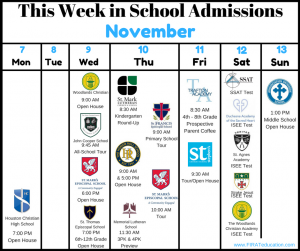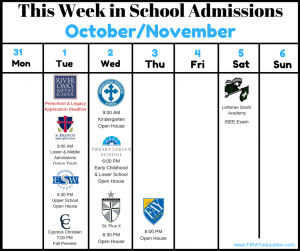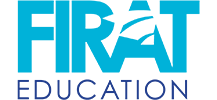(Click on the calendar to enlarge)
Applications are due this week for Annunciation Orthodox School, Houston Christian High School, St. Agnes Academy, St. Michael Catholic School, and Episcopal High School.
December 17th is the regular registration deadline for the January 7th SSAT and ISEE exams. Episcopal High School, Houston Christian High School, Lutheran High North, Awty International School, The John Cooper School, and The Kinkaid School are hosting the ISEE on this test date.
Please note: Registration for the ISEE is available up to three weeks before the test for a fee of $105.00. Late registration is available after the three week deadline has passed up to two weeks before the test date for an additional $25.00. If you have questions about whether or not you should take the ISEE more than once, please contact us.
Registration for this SSAT date closes on January 4th with a late or rush registration fee.
Please post comments here to let us know about your admissions experience!
Every couple of weeks we see new national headlines about the Common Core State Standards. However, some states, like Texas have refused to adopt these standards, although they are required by federal law. How are the states able to do this, and why are some choosing to do so? And is this a political issue or an education issue?
So to answer these questions, let’s remember that items not explicitly mentioned in the U.S. Constitution are left up to the states to decide and manage. Education is one of these issues. The federal government has no constitutional authority over states regarding education. However, the U.S. government does have one thing all states are wanting more of…money. So with all of these national education reforms/movements, the federal government cannot force states to participate, but can reward those who do with additional federal monies. This is where the politics comes in.
But let’s go back to the standards momentarily. Years ago, a high achieving student could move from one state to another and either be: way ahead of the new school, about on level at the new school, or way behind at the new school. Often, the student was either way ahead or way behind because the state standards were so different from state to state. Some higher achieving states were significantly ahead of some of the lower achieving states and one could simply look at the standards, what was expected in each grade, to understand why. So the federal government wanted to normalize the standards so the states would be more equal. Generally, the federal government erred on the side of the more challenging standards, bringing the lower ones up, rather than vice versa. Thus in 2009, during President Obama’s administration, the Common Core State Standards were launched.
So here is where the politicians get involved. Most of the states quickly adopted the new standards and were granted access to the additional funds. However, small minority of the states were slower to respond and some have refused even to this day, seven years later. Specifically, in Texas, where the Common Core standards have yet to be adopted, political leaders claim so much money was spent on the Texas standards (TEKS) that they do not need Common Core. Other Texas leaders point to wanting less federal oversight over a state’s rights (education), so they refuse to adopt, and some Republicans have publicly vowed to fight any legislation President Obama tries to pass.
However, what about the actual standards? The Common Core standards are very similar to the TEKS. There are few differences here and there, for example personal finance in math (which is included in the TEKS, but not Common Core) or in which grades specific skills are covered (money is covered in 2nd grade in Common Core but introduced in Kindergarten in TEKS), but overall, they are more similar than different. The kinds of expectations and what the students are able to do are very similar by the end of the process, high school graduation.
In conclusion, I do not feel this should be a political issue. It seems that too often politicians, depending on which side of the aisle he or she falls on, dictates their view on this. This should be an issue of education, and which serves our children better. Both sets of standards have their strengths and weaknesses, and blanket statements about either are not productive nor helpful. Texas could desperately use additional federal funds to help fund education, so let’s keep in mind what’s important, not federal or state control, but student achievement. I’m not advocating for Common Core adoption in states that have not adopted them, in fact, I would oppose that. However, let’s at least examine both without bias or pre-judgement and implement the best teaching practices and standards for our students. No matter who developed them or where they came from. All students deserve the best we, as a society, can give them.

(Click on the calendar to enlarge)
This week there are tours and open houses at Houston Christian High School, The Woodlands Christian Academy, The John Cooper School, St. Mark’s Episcopal School, St. Thomas Episcopal School, St. Mark Lutheran School, St. Francis Episcopal School, The Honor Roll School, Memorial Lutheran School, Trafton Academy, St. Stephen’s School, and Annunciation Orthodox School.
Good luck to everyone taking the ISEE at Duchesne, St. Agnes, Strake Jesuit, and The Woodlands Christian Academy and the SSAT this Saturday!
Registration for these ISEE exams has closed.
Rush registration for the SSAT closes on Wednesday November 9th.
The regular registration deadline for the December 3rd ISEE at The Honor Roll School and Westbury Christian is Saturday November 12th.
Please note: Registration for the ISEE is available up to three weeks before the test for a fee of $105.00. Late registration is available after the three week deadline has passed up to two weeks before the test date for an additional $25.00. If you have questions about whether or not you should take the ISEE more than once, please contact us.
ISEE scores for written exams are available online 7 days after the exam is scored (not exam day). You can receive scores the day they are scored for an addition $40.
Online exam scores are available online as soon as the exam has been scored.
Please post comments here to let us know how the open houses went for you!

(Click on the calendar to enlarge)
Preschool and Legacy applications for River Oaks Baptist School are due THIS Tuesday. Check their website to ensure you have taken all the steps to complete your application.
This week there are tours and open houses at St. Francis Episcopal, Emery/Weiner School, Cypress Christian, Annunciation Orthodox School, Presbyterian School, St. Pius X, and The Fay School.
Good luck to everyone taking the ISEE at Lutheran South Academy this Saturday!
Registration for the November Lutheran South ISEE is closed.
Please note: Registration for the ISEE is available up to three weeks before the test for a fee of $105.00. Late registration is available after the three week deadline has passed up to two weeks before the test date for an additional $25.00. If you have questions about whether or not you should take the ISEE more than once, please contact us.
Please post comments here to let us know how the open houses went for you!

Some parents are highly concerned with the curriculum a school uses, while others are not as interested in these details as long as their child is learning what he or she is supposed to learn. Both of these perspectives are fine and most schools do not look upon one viewpoint as being superior to another, especially in the admissions process. If you are not concerned with the details, do not feel you must ask about the details of the curriculum. However, if you are concerned about the curriculum, please reflect on my thoughts below.
Often parents and visitors at school open houses or tours ask about curriculum in a general sense. “What math curriculum do you use?”, or “What kind of curriculum does this school follow?” are questions often heard. However, this seemingly simple question can have a multitude of answers depending on the inquirers’ understanding of the word “curriculum” and the schools’ understanding of the question.
Let me explain…
Curriculum is a term often overused and not well defined. Inside education, curriculum refers to the programs or overall teaching methods used to teach the required grade level objectives. Depending on which state you live in, your child is required to either learn the common core objectives for each grade, or the state objectives (it is up to the state to decide if they want to follow their own or common core objectives– not really the political question that it has become, but that is a topic for another day). So the chosen curriculum, at times is a program purchased by the school or district, or a program is developed by the school themselves. This program is the plan (what they will cover and when they will cover it) to facilitate student growth to attaining those objectives.
With all that being said, if you ask a school what their math curriculum is, and they reply with Envision Math, Everyday Math, or Math in Focus, etc., unless you are highly familiar with different brands of curriculum (or program), those answers would not mean much to you.
As a parent and educator, when I am exploring a school, I am more concerned with the teaching method or overall style of the curriculum or instruction, rather than brand of curriculum. Possible questions to consider asking schools:
- What is the style/method per subjects (will vary between subjects, even at lower grades)?
- Do they follow a project-based or assessment-based model? (as students’ progress in a project based model, they demonstrate their knowledge through projects rather than tests)
- How long have you been using this curriculum?
Here are some questions you can ask yourself:
- Is their philosophy and/or method something I agree with or can get on board with?
- Will I be able to help my child at home if he/she is learning in this method?
- What curriculum am I most comfortable with?
Many schools will not use just one philosophy or style and will supplement the curriculum with valuable pieces from other methods. Either way, understanding these methods and how the school views each subject can be of vital importance to not only selecting the best school for your child, but also encouraging your child’s success.
I’ve included a short list of some of the most common math and reading programs here.
As a parent looking at the vast array of private school options, admission open houses can be a wonderful tool to helping you choose the best fit for your child.
In most large cities, there are many great private schools to choose from. As a parent, most of us will not have the time to thoroughly explore and visit every schooling option available. However, after considering your values and/or working with an educational consultant, hopefully you are able to narrow down your options to three to five schools. From that narrowed down list, is where school visits and admission open houses can help you find the perfect fit. From the minute you step foot on campus you have a feeling about the type of environment that school has built. Through the presentation and tours, hopefully you begin to see the schools values and areas they emphasize (academics, community, athletics, social development, etc.). Of course, during your visit, any specific points of interest to you, certainly ask questions to the admissions staff if those topics have not already been discussed or you would like more information.
After visiting all the finalist schools, consider your personal & family values – then match those to each school’s values. The closer the match, the better the fit for your child and family.
Group admission open houses can be less intimidating. However, individual tours can also address your specific questions. Either way, walking around and visiting the school first hand will give you the best “feeling” for the school and fit for your child.
What do I ask during parent/teacher conferences? The more prepared you are for your parent/teacher conference, the more productive it will be. We’ve put together a list of questions to get you started. Print it out, and bring it with you to take notes.
Print-Ready Parent/Teacher Conference Guide
What do I do after the parent-teacher conferences to follow-up? After the conference, it’s always a good idea to recap your notes in an email to the teacher. Listing areas in need of improvement, steps that will happen at school and at home, and confirm the check-in date. Putting everything in an email to your teacher can ensure a team effort and clear plan moving forward to help your child grow.
#CollegePrepChat was delighted to host Melissa Williams, children’s author and founder of Read3Zero, as our guest for this week’s topic: Importance of literacy at an early age for higher education.
How exactly does #literacy at a young age affect #highered? @MelissaAuthor #CollegePrepChat
— FIRAT Education (@FIRATeducation) September 4, 2014
Melissa Williams along with a non-profit out of Washington DC, GlobalFund4Children, participated very actively. We have had inputs from involved parents who have been reading and writing with their infants as early as they were born. Clearly, literacy starts at an early age, and needs to be followed through in school and beyond. Balance of life is critical for all kids who is pre-school and school age. https://www.firateducation.com/fes/collegeprepchat-literacy/Parent involvement to “act” on the stories helps kids develop motor and processing skills. And multiple reports shared during the chat show direct correlation between early childhood literacy and future success in school, college admissions, and attainment of a good job as adults.
This was by far the best #CollegePrepChat yet! The time flew by, and everyone wanted more! We may come back to this topic some time soon! In the meantime, continue to join us every Wed at 9p CST! If you have any ideas for a future topic, please contact us, and we will consider!
Once again, THANK YOU to my dear friend and colleague Melissa Williams for making #CollegePrepChat such a huge success tonight! Hope to see you soon again!
August 13, 2014 – 10:05pm
#CollegePrepChat opened with a simple question today:
FIRAT Education (@FIRATeducation)
8/13/14, 9:00 PM
What is it about the #college #essays that trouble you and how do you cope with it? #CollegePrepChat #HighSchool #seniors #CommonApp
We were delighted to hear responses from counselors, teachers, and professors who discussed their tactics in helping their students. Some of them asked follow up questions, too! The main message was that unlike other essays which require outlining and then writing, college essays should start with the writing and then editing – skip the outlining in order not to sacrifice creativity. https://www.firateducation.com/fes/collegeprepchat-digs-into-college-essays/
In the chat, @commonapp, @accepted, @ceoglam were mentioned.
We look forward to seeing you next Wed at 9pm CST!
AUGUST 6, 2014, 10:10PM CST
We have just completed our #CollegePrepChat for this week! The topic was the Common Application because the new 2014-15 year version was released on August 1 for the incoming seniors! While we did not see interaction from @CommonApp itself, we have seen responses from counselors and teachers from the Houston area as well as UK who chimed in. Recommendation was that essays must be prioritized and the application must be started as early as possible, if not the first day, August 1! Counselors from FES have mentioned that colleges can track the date a Common App profile has been created, implying that interest in a particular college can be demonstrated by the date the profile was created.
Another successful interaction by all participants, especially those who were mentioned during the chat, THANK YOU: @Forbes, @HoustonTxDotGov, @eeHour, @jonyprofit, @USATodayCollege, @TurkishEmbassy, @NorwayUS, and of course, @CommonApp. See you next week!
Where do you start w/ your #CommonApp? #CollegePrepChat @CommonApp
— FIRAT Education (@FIRATeducation) August 7, 2014
https://www.firateducation.com/fes/commonapp_collegeprepchat/
